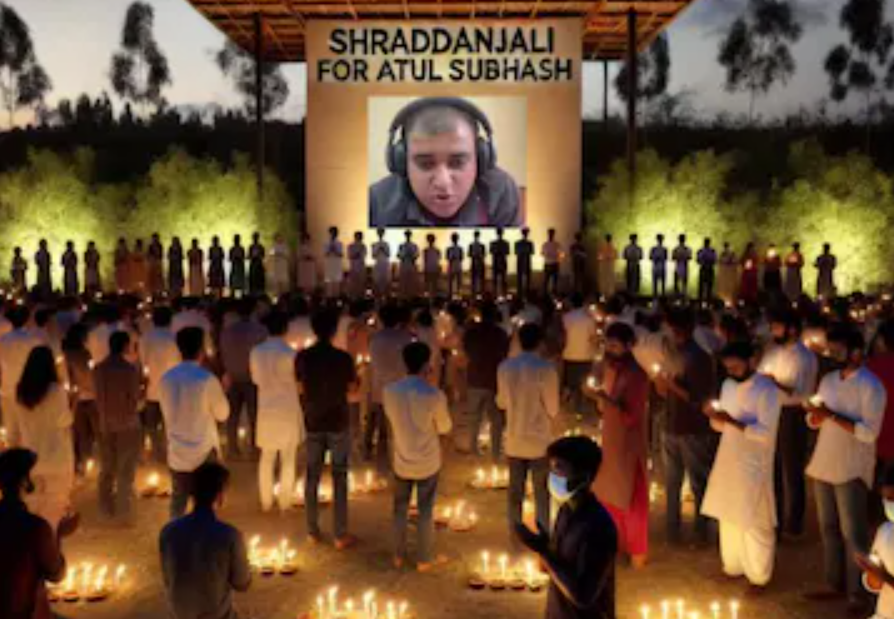“Uncover the tragic story of Atul Subhash , exposing judicial corruption, misuse of laws, and the urgent need for reform.”
“Don’t feel like reading? Immerse yourself in the chilling tale through our audiobook version—just hit play and let the story unfold!” 👇👇👇
Introduction
The tragic story of Atul Subhash, a young and talented Artificial Intelligence and Machine Learning expert, has left an indelible mark on Indian society. His death has sparked widespread outrage and brought to light the systemic flaws in India’s judicial and legal frameworks. Atul’s struggle against harassment, corruption, and a dysfunctional system reflects the harsh realities faced by countless individuals in the country.
In this blog, we delve deep into Atul’s heartbreaking journey, exposing the judicial inefficiencies and corruption that led to his untimely demise. More importantly, we seek to create awareness about the urgent need for reform to ensure justice prevails.
A Promising Life Cut Short
Atul Subhash, a resident of Bengaluru, was an accomplished AI and ML expert. His expertise was a valuable asset to the nation, but his potential was stifled by relentless legal battles and personal struggles.

Atul’s life took a turn for the worse when his marital discord escalated into a series of legal cases. What began as a domestic dispute quickly spiraled into a complex web of allegations, counter-allegations, and court dates. Over a span of just three years, Atul was forced to attend 120 court hearings. The sheer frequency of these appearances left him emotionally and financially drained.
The Judiciary’s Role in Atul’s Struggle
Excessive Court Dates and Delays
Atul’s ordeal highlights a critical issue: the inefficiency of India’s judiciary. Despite attending over 40 court dates in a short span, Atul found little to no resolution. Frequent adjournments due to absent judges, lawyer strikes, or opposing parties failing to appear compounded his woes.
- Systemic Corruption: Atul’s testimony revealed shocking instances of bribery within the judicial system. Clerks and judges allegedly demanded exorbitant amounts of money to expedite his cases.
- Emotional Toll: The prolonged litigation process took a severe toll on Atul’s mental health, culminating in despair and hopelessness.
Shocking Allegations of Misuse of Law
Unethical Demands
Atul disclosed harrowing details of his personal life, including degrading demands made by his wife. He described being coerced into humiliating acts and enduring emotional abuse. Such demands highlight the misuse of legal provisions meant to protect individuals but often weaponized to exploit others.
Unreasonable Financial Expectations
Atul faced demands for astronomical sums of money. His wife sought ₹1 crore initially, which escalated to ₹3 crores over time. Furthermore, a maintenance order stipulated monthly payments of ₹80,000 for a young child and ₹40,000 for his estranged wife, despite her employment at a reputed firm.
Systemic Corruption and Judicial Malpractices
Atul’s story sheds light on the dark underbelly of India’s judicial system. From bribery allegations against Judge Rita Kaushik to the manipulation of court processes, his case exemplifies the corruption that undermines justice.
- Bribery in Family Courts: Atul revealed that clerks demanded lakhs of rupees to secure favorable outcomes or speed up proceedings. Such practices tarnish the integrity of the judiciary and erode public trust.
- Lack of Oversight: Despite multiple complaints, there appeared to be no checks or investigations into the alleged corruption.
The Psychological Impact
Atul’s struggle was not merely legal or financial—it was deeply emotional. His inability to meet his child and the repeated harassment he faced led to severe mental health challenges. In his final note, Atul expressed his anguish, calling attention to the inefficiency and corruption of the system.
The Larger Issue: A Flawed Legal System
Atul’s story is not an isolated incident. It is a reflection of a larger issue—the misuse of laws and the inefficiencies of India’s judicial system.
Key Issues:
- Weaponization of Laws: Certain legal provisions, designed to protect vulnerable individuals, are often exploited to harass and extort.
- Judicial Delays: The backlog of cases and frequent adjournments result in prolonged legal battles, denying timely justice.
- Corruption: Rampant corruption at various levels undermines the credibility of the judiciary.
A Call for Reform
The tragic demise of Atul Subhash should serve as a wake-up call for the nation. To prevent such incidents in the future, systemic reforms are urgently needed.
Suggested Reforms:
- Transparency in Judiciary:
- Mandatory video recording of court proceedings.
- Digital tracking of case progress to ensure accountability.
- Strict Action Against Corruption:
- Establish independent bodies to investigate allegations of bribery and corruption within the judiciary.
- Reform in Family Laws:
- Balance the rights of all parties to prevent misuse of legal provisions.
- Mental Health Support:
- Provide legal and psychological counseling for individuals embroiled in prolonged disputes.
- Efficient Case Management:
- Introduce fast-track courts for cases involving family disputes.
Conclusion: Justice for Atul Subhash
Atul Subhash’s death is a stark reminder of the urgent need for judicial reform in India. His voice, silenced by despair, echoes the pain of countless others who suffer under the weight of an inefficient and corrupt system.
By raising awareness and demanding accountability, we can ensure that Atul’s sacrifice does not go in vain. Let us stand together to seek justice for Atul and advocate for a legal system that upholds fairness, efficiency, and integrity.
#JusticeForAtul #JudicialReform #EndCorruption












